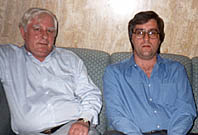
Achieving Genuine Language Learning [Archives:1999/01/Culture]
January 4 1999

Q: How long has the ELT been involved in the English language program in Yemen?
A: It’s been over a period of about 12 years. We received from the ministry of Education the Yemeni syllabus for English. In the late ’80s we came and we went around schools and checked the whole situation. Then we produced draft materials which we tried in specific areas for the period of two years ’90 – ’92. After the contents were tried and evaluated, we produced the first book and that’s been on going now.
At the moment there are five books covering the whole course in the first five years of English. In next September, the sixth year book will be introduced into Yemeni schools, completing the six-year course.
Q: Could you tell us about the conference you have attended in Yemen?
A: Part of the reason for the conference is to meet with school inspectors from all over the country. One thing they will be doing is when they return back to their areas they will be gathering feedback from all the teachers about the six years of the Crescent English course. Then we will have a complete review of the course starting at year one again, based on the comments which we have received from the teachers who have been using the book.
The whole point of an English language course is it can’t stand still. Obviously we will be looking for an on-going improvement as we go back in revising the book from next year.
Q: Most of our school graduates can’t even write a simple sentence in English. How do you explain this?
A: I think that is an exaggeration that they can’t even write a simple sentence. The thing is what you have got is a whole complex which involves the teachers, the level of skills of the teachers, the actual course book. There is also the question of the inspectors and the advise they give to teachers. So what you have got is a big package, you also got the attitude of pupils towards learning English e.g.; the girls tend to be much better than boys and that raises the question: Why?
Q: What are the problems facing the Yemeni student in learning English?
A: The major problem is that in some areas there are large classes. In some areas there are teachers with no proper training. The point is one should not look at the negative side, these problems are been addressed extensively. In our conference we have addressed these problems.
Q: Do you think we should introduce the English curriculum to primary schools in Yemen?
A: That is a question which is totally the responsibility of the Ministry of Education, and how they see things. Remember my role is as a writer to develop the course, but it is not my place to say anything. The ministry decides what they want to do. I would not be so rude as to try and tell the ministry what to do.
Q: How did you find the participants coming from different governorate in Yemen?
A: I have never seen a more enthusiastic group of inspectors anywhere. Their level of skill and their level of commitment I can regard as very high.
Mr. Richard Peacock is the Manager of the Education Division at the ELTA/OUP and is responsible for all the production of thier text books around the world.
Q: As the education manager what are you planing for Yemen?
A: Part of our workshop is to develop plans for the future of the Yemeni education system. Immediate plans are to finish book six for next year and then start a complete revision of the Crescent series in light of the feedback we receive from the inspectors. We also discussed the possibility of running future workshops for inspectors. We would like, if possible, to expand our program of workshops and teacher training.
Q: How do you evaluate the workshop?
A: We have been to many workshops and training sessions in the past, this one has been definitely the most positive and encouraging workshop we have ever had.
By – Ismail Al-Ghabiry.
Yemen Yimes.
——
[archive-e:01-v:1999-y:1999-d:1999-01-04-p:./1999/iss01/culture.htm]


